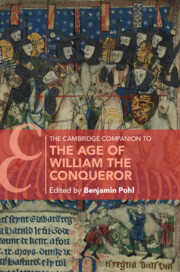22095 results in Cambridge Companions
16 - Ecocriticism and the Body
- from Part II - Critical Methodologies
-
-
- Book:
- The Cambridge Companion to American Literature and the Body
- Published online:
- 30 July 2022
- Print publication:
- 30 June 2022, pp 242-258
-
- Chapter
- Export citation
11 - How to Read Disabled Bodies in History
- from Part II - Critical Methodologies
-
-
- Book:
- The Cambridge Companion to American Literature and the Body
- Published online:
- 30 July 2022
- Print publication:
- 30 June 2022, pp 165-179
-
- Chapter
- Export citation
8 - Contemporary North American Transgender Literature
- from Part I - Genres
-
-
- Book:
- The Cambridge Companion to American Literature and the Body
- Published online:
- 30 July 2022
- Print publication:
- 30 June 2022, pp 117-132
-
- Chapter
- Export citation
Acknowledgments
-
- Book:
- The Cambridge Companion to American Literature and the Body
- Published online:
- 30 July 2022
- Print publication:
- 30 June 2022, pp xv-xvi
-
- Chapter
- Export citation
Copyright page
-
- Book:
- The Cambridge Companion to American Literature and the Body
- Published online:
- 30 July 2022
- Print publication:
- 30 June 2022, pp iv-iv
-
- Chapter
- Export citation
9 - Feminist Theory, Feminist Criticism, and the Sex/Gender Distinction
- from Part II - Critical Methodologies
-
-
- Book:
- The Cambridge Companion to American Literature and the Body
- Published online:
- 30 July 2022
- Print publication:
- 30 June 2022, pp 135-149
-
- Chapter
- Export citation
Part I - Genres
-
- Book:
- The Cambridge Companion to American Literature and the Body
- Published online:
- 30 July 2022
- Print publication:
- 30 June 2022, pp 11-132
-
- Chapter
- Export citation
4 - Monstrous Bodies of the American Gothic
- from Part I - Genres
-
-
- Book:
- The Cambridge Companion to American Literature and the Body
- Published online:
- 30 July 2022
- Print publication:
- 30 June 2022, pp 59-72
-
- Chapter
- Export citation
Contents
-
- Book:
- The Cambridge Companion to American Literature and the Body
- Published online:
- 30 July 2022
- Print publication:
- 30 June 2022, pp v-vi
-
- Chapter
- Export citation
Chronology of Publications and Events
-
- Book:
- The Cambridge Companion to American Literature and the Body
- Published online:
- 30 July 2022
- Print publication:
- 30 June 2022, pp ix-xiv
-
- Chapter
- Export citation
13 - Health Humanities, Illness, and the Body in American Literature
- from Part II - Critical Methodologies
-
-
- Book:
- The Cambridge Companion to American Literature and the Body
- Published online:
- 30 July 2022
- Print publication:
- 30 June 2022, pp 195-209
-
- Chapter
- Export citation
15 - The Black Body and the Reading of Race
- from Part II - Critical Methodologies
-
-
- Book:
- The Cambridge Companion to American Literature and the Body
- Published online:
- 30 July 2022
- Print publication:
- 30 June 2022, pp 227-241
-
- Chapter
- Export citation
1 - Bodies in Early US-Atlantic Theater
- from Part I - Genres
-
-
- Book:
- The Cambridge Companion to American Literature and the Body
- Published online:
- 30 July 2022
- Print publication:
- 30 June 2022, pp 13-28
-
- Chapter
- Export citation

The Cambridge Companion to the Age of William the Conqueror
-
- Published online:
- 15 June 2022
- Print publication:
- 09 June 2022
2 - The Scope of Wisdom Literature
- from Part I - The Context of Wisdom Literature
-
-
- Book:
- The Cambridge Companion to Biblical Wisdom Literature
- Published online:
- 28 July 2022
- Print publication:
- 09 June 2022, pp 13-33
-
- Chapter
- Export citation
Copyright page
-
- Book:
- The Cambridge Companion to the Age of William the Conqueror
- Published online:
- 15 June 2022
- Print publication:
- 09 June 2022, pp iv-iv
-
- Chapter
- Export citation
11 - The Song of Songs
- from Part II - Wisdom Literature in the Hebrew Bible
-
-
- Book:
- The Cambridge Companion to Biblical Wisdom Literature
- Published online:
- 28 July 2022
- Print publication:
- 09 June 2022, pp 200-218
-
- Chapter
- Export citation
3 - Scandinavia and the North Sea World
- from Part I - Home and Away
-
-
- Book:
- The Cambridge Companion to the Age of William the Conqueror
- Published online:
- 15 June 2022
- Print publication:
- 09 June 2022, pp 52-72
-
- Chapter
- Export citation
11 - Warfare and Violence
- from Part IV - Cultural Perspectives
-
-
- Book:
- The Cambridge Companion to the Age of William the Conqueror
- Published online:
- 15 June 2022
- Print publication:
- 09 June 2022, pp 225-243
-
- Chapter
- Export citation
Part IV - Themes in the Wisdom Literature
-
- Book:
- The Cambridge Companion to Biblical Wisdom Literature
- Published online:
- 28 July 2022
- Print publication:
- 09 June 2022, pp 389-474
-
- Chapter
- Export citation

